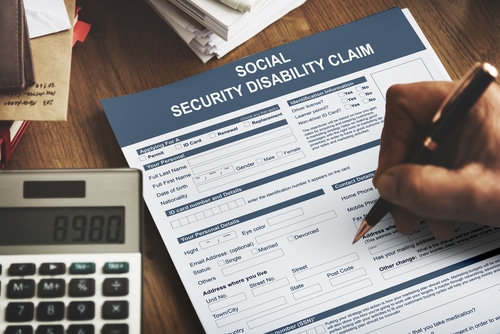What is Social Security Disability?
Social Security Disability is a general term that refers to two benefit programs that the Social Security Administration offers for persons with disabilities. The two benefit programs are Social Security Income (SSI) and Social Security Disability Insurance (SSDI).
SSI is a benefit program that is need-based and offers assistance to aged, blind, and disabled persons who have little or no income.
SSDI is a benefit program for disabled persons who have worked in qualifying jobs for a certain number of years. Unlike SSI, SSDI is not a need-based program, it is what is called an earned benefit.
Do I Qualify For Social Security Disability?
 Are You Disabled?
Are You Disabled?
The first step to determining whether you qualify for Social Security Disability is to determine if you are disabled. A person applying for either must be either blind or disabled (or for SSI, older than 65). The Social Security Administration defines a disability as a condition must interfere with an individual’s ability to achieve gainful employment.
In order to make it easier to know if you have a qualifying disability, the Social Security Administration has published a “Blue Book,” which lists many of the conditions that qualify as disabilities. The Blue Book is divided into two parts, Part A and Part B. Part A applies to individuals who are adults (older than 18). Part B applies to individuals who are younger than 18. The disabilities listed in the Blue Book are diverse, and include mental disorders, musculoskeletal disorders, neurological disorders, and many more.
The Social Security Administration also has a “Compassionate Allowances” list that allows persons suffering from a more severe disability to get expedited consideration of their application. The compassionate allowances list identifies disabling conditions that automatically qualify someone for Social Security Disability. The list is available here.
Work Credits for SSDI
If you are disabled, the next step is to determine if you qualify for either SSDI or SSI. Unlike SSI, Social Security Disability Insurance (SSDI) is an earned benefit. This means that in order to receive SSDI, an individual must have earned a certain number of “work credits.” Work credits are earned by working and paying FICA taxes. An individual can earn one credit for each $1,200 of earnings, up to four credits per year.
If you are 62 or older, you will need 40 credits in order to qualify for SSDI. Workers who are younger than 62, though, can qualify for SSDI with fewer work credits.
You may qualify if:
- Before age 24 – You have six credits earned in the three-year period when your disability starts.
- Age 24 to 31 – You have credit for working half the time between age 21 and the time at which you became disabled. For example, if you become disabled at 29 you would need credits for four years of work (16 credits).
- Age 31 to 62 – Consult the Social Security Administration’s useful chart for the number of credits needed. One further restriction for this age group is that 20 of the credits must have been earned in the 10 years immediately prior to when you became disabled.
If you are blind or have low vision, it is important to keep in mind that different rules for work credits apply.
Limited Income and Limited Resources for SSI
SSI is a need-based benefit. This means that in order to qualify for SSI, an individual must have both limited income and limited resources. To determine whether you have limited resources, the Social Security Administration will look at some things you own such as cash, land, vehicles, and personal property. If these assets are worth less than $2,000, you have limited resources. For a married couple the threshold is $3,000. In valuing resources, the Social Security Administration does not include certain assets such as the home you live in and one car.
In addition to having limited resources, you must also have limited income to qualify for SSI. To determine whether you have limited income, the Social Security Administration will calculate your countable income. Countable income can include earned income (money you make from a job) and also other types of income, such as a social security benefit. Certain types of income such as disaster assistance, income tax refunds, and loans are excluded from countable income.
If your countable income is less than the Federal Benefit Rate, you will likely have limited income. In 2014, the federal benefit rate is $721 per month for an individual and $1,082 per month for a couple.
Applying for Social Security Disability
If you believe you qualify for social security disability, you may want to apply for one of the benefit programs. An experienced social security disability attorney can help you be sure that you qualify and assist you with the application process. An attorney can also help you appeal a decision if you have been denied for SSI or SSDI and believe that you should receive the benefit.
